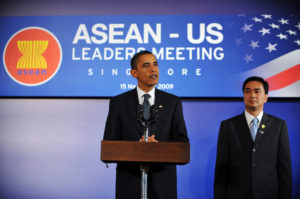 ASEAN and U.S.: As predicted by this blog, the Obama Administration is moving to create a comprehensive political-economic rapprochement with East and Southeast Asia. The economic arm of this policy direction will branch off of the existing Trans-Pacific Partnership (TPP). So far, the TTP includes a free-trade agreements (FTA) with Brunei, Chile, New Zealand and Singapore, which was concluded in 2005, but Washington hopes to expand Australia, Peru, South Korea, and Vietnam in the near term. Long term, the idea is to incorporate most of Southeast and East Asia. The U.S. does not want to see a line drawn down the middle of the Pacific with China in a leading roll opposite the U.S., similar to the situation between the U.S. and the EU, with the U.S. outside the bloc.
ASEAN and U.S.: As predicted by this blog, the Obama Administration is moving to create a comprehensive political-economic rapprochement with East and Southeast Asia. The economic arm of this policy direction will branch off of the existing Trans-Pacific Partnership (TPP). So far, the TTP includes a free-trade agreements (FTA) with Brunei, Chile, New Zealand and Singapore, which was concluded in 2005, but Washington hopes to expand Australia, Peru, South Korea, and Vietnam in the near term. Long term, the idea is to incorporate most of Southeast and East Asia. The U.S. does not want to see a line drawn down the middle of the Pacific with China in a leading roll opposite the U.S., similar to the situation between the U.S. and the EU, with the U.S. outside the bloc.
The U.S., China, and Japan are already promoting divergent overlapping frameworks for an Asian-Pacific Community. What is clear is that many Southeast Asian nations wish for a stronger U.S. presence in the region to balance China, something that Japan cannot do alone.
Michael Turton has an interesting post concerning objections to free trade agreements with China, most of it is concerning Taiwan, but he also outlines some grassroots issues in various Southeast Asian states, as well as the outcome of the “Early Harvest” program in Thailand. Warning: Turton is quite anti-China, to put it lightly.
Philippines: More than 70 people have been arrested since the national ban on firearms went into effect. To enforce the ban, there have been 3500 checkpoints set up around the country. The measure will not only apply to civilians but also off-duty military personnel, police officers, and private security. There are an estimated one million unlicensed firearms in the nation. The ban will last for five months, as part of an effort to stem the culture of organized political violence, which recently culminated in the November’s Election Massacre.